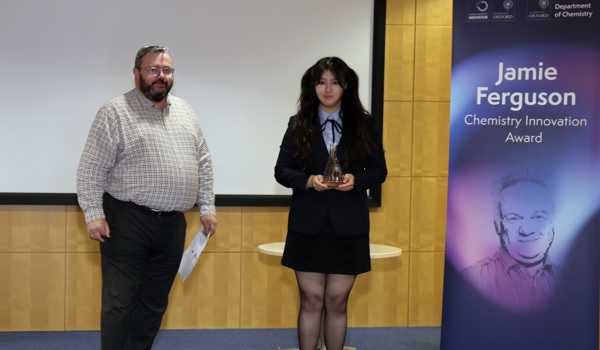30 Sep 2022
Department welcomes new Faculty members in Biomaterials, Bioelectronics, Mechanical Engineering and Thermofluids

L to R: Konstantina Vogiatzaki, Chris Proctor, Malavika Nair, Luke Doherty
Malavika Nair joins the department as Associate Professor of Biomaterials at the Institute of Biomedical Engineering. Malavika is a materials scientist by training, obtaining a BA, MSci in Natural Sciences (2012-2016) and a PhD (2016-2019) from the University of Cambridge. Malavika's doctoral work, funded by a Gates Cambridge Scholarship, was focused on the multiscale characterisation of ice, collagen, and ice-templated collagen scaffolds for tissue engineering. This was followed by post-doctoral research in 2020 combining machine learning techniques with experimental biomaterials datasets, and the award of a three-year stipendiary research fellowship at Emmanuel College where Malavika began working on electroactive biomaterials for tissue regeneration. Malavika is also the current membership secretary of the Biomaterials Committee Group (BMAG), and has been an Associate Fellow of the Higher Education Academy since 2020.
Chris Proctor is Associate Professor of Bioelectronics. Chris joins us from Cambridge where he was a Senior Research Fellow and also led the Bionic Systems Group. He received a B.Sc. in Interdisciplinary Physics from the University of Michigan in 2008. Following two years as a general scientist at the U.S. Nuclear Regulatory Commission, he earned a Ph.D. in Materials from the University of California, Santa Barbara where he investigated loss mechanisms in organic photovoltaics (2015). Subsequently, Chris was awarded a postdoctoral fellowship from Whitaker International to develop implantable bioelectronic devices for treating neurological disorders in the Bioelectronics Department at the Ecole des Mines de St Etienne. He then joined the University of Cambridge as a Research Associate and Borysiewicz Biomedical Sciences Fellow. In 2020, Chris started as a BBSRC David Phillips Fellow and group leader in the Engineering Department.
Konstantina Vogiatzaki is Associate Professor of Engineering Science (Mechanical Engineering). Previously Konstantina was a Senior Lecturer and an EPSRC-UKRI Innovation Fellow in the field of cryogenic fluid dynamics at King’s College London. Her research is dedicated to developing the fundamental science behind fluids phase changes and the complementary numerical tools (based on Computational Fluid Dynamics and more recently Machine Learning) necessary to enable design optimisation of next generation of energy production and propulsion systems that will have minimum carbon footprint and high efficiency. She has also extended her research towards applying the multi-scale approaches she develops to a wider range of complex systems including carbon capture technologies and the biomedical field (lung modelling and cryosurgery). She graduated from the National Technical University of Athens in 2005 with a degree in Applied Mathematics, and obtained her PhD from Imperial College London with a thesis entitled “Stochastic and deterministic multiple mapping conditioning for jet flames”. She was awarded the prestigious Bernard Lewis Fellowship by the Combustion Institute in 2010 for her work on the extension of a novel turbulent combustion modelling framework (namely Multiple Mapping Conditioning, MMC). Following her PhD she worked as a Post-Doctoral Researcher at Imperial College London and Stuttgart University for two years before moving to the Massachusetts Institute of Technology (MIT), where she was appointed as a Research Scientist at the Mechanical Engineering Department for two years.
Luke Doherty has been appointed as a Departmental Lecturer in High Speed Flows, continuing to lend his extensive experience in experimental hypersonic aerodynamics to the department. He graduated in 2008 from The University of Queensland, Australia with Bachelor of Engineering (Hons I) and Bachelor of Science degrees. He then completed his doctorate at the same university within the Centre for Hypersonics, measuring aerodynamic forces on an airframe integrated scramjet engine in the T4 Shock Tunnel Facility. Joining the Oxford Thermofluids Institute in 2014 as a post-doctoral researcher, and then as a Senior Researcher in 2018, he has spent the last 8 years developing, commissioning and managing the Oxford High Speed Facilities – the T6 Stalker Tunnel, the High Density Tunnel and, more recently, the Low Density Tunnel; unique facilities which have placed Oxford at the forefront of high-speed experimental research.




